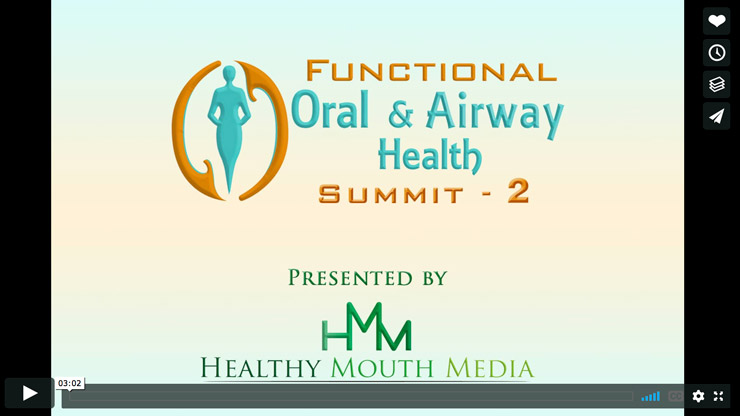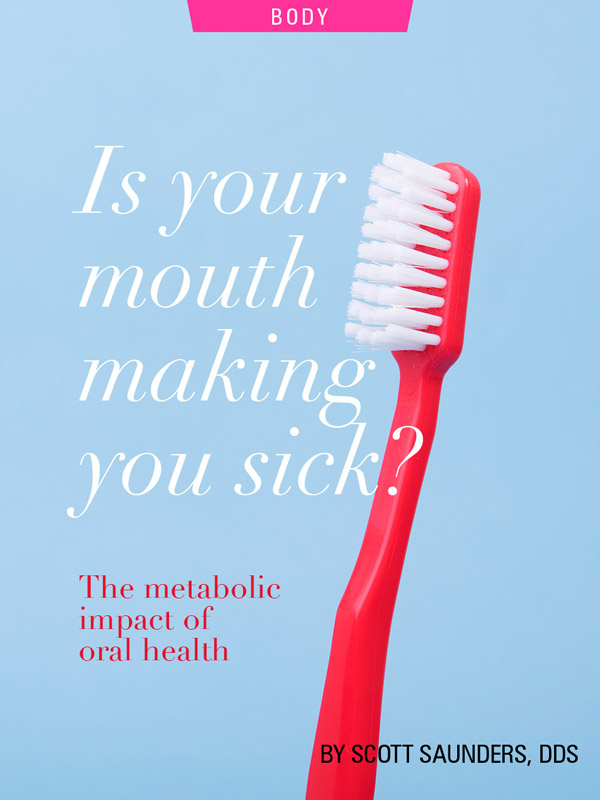How oral health plays a pivotal role in our overall health — the much overlooked aspect of holistic wellbeing
—
Think about the last time you visited a doctor — ANY doctor. Did s/he ever once ask you if you had any dental problems? Any dental work done recently? Or look inside your mouth for anything other than the standard “say aahhh” 2-second throat inspection? I didn’t think so.
And this is a problem.
What if the most accessible route to shifting your life towards measurably better whole-body health was lurking where you — or your doctor — never thought to look? That could be — literally — right under your nose.
As a Best Self Magazine reader, you’re looking for information and solutions that are reliable, science-based and needle-moving, maybe a little ‘outside the box’. You also may be tired of the ‘same-old-same-old’ health advice. And, just maybe… you know too much NOT to question the standard health-care ‘script’, because it’s not congruent with what you’ve been learning.
Typical dental information you find online provides the same basic, tired (and often corporate-sponsored) message. And, no disrespect to my practicing colleagues, but your dentist might be giving you those same tired — and often ineffectual — messages: “brush, floss, see me for twice-yearly cleanings and checkups… and of course, be sure to use a fluoride toothpaste and drink fluoridated tap water… and if (or when) you have cavities, I’ll fill them.”
Sadly, that’s usually the extent of the discussion at your check-up. Your overall body health likely gets addressed only with a cursory medical history review with your dental hygienist, and without a clear medical issue like heart-valve disease or cancer, you don’t discuss how what happens in your mouth does NOT STAY in your mouth.
Your mouth: The Great Unrecognized Connector
The concept of oral-systemic health isn’t new. For thousands of years, it was how physicians treated — and healed — their patients…until the early 20th Century, and the advent of reductionist drug therapy, which diminished healing to giving a pill to treat a symptom without seeking an underlying cause.
The medical literature has been covering oral-systemic research for 100 years-plus. A landmark review published in 2000 in a top-tier microbiology journal resurrected talk of the long-‘dead’ focal infection theory (proposed by pioneer dental researcher Dr. Weston A. Price, and, supposedly, discredited).
The authors cite 158 published articles supporting links between oral diseases and diabetes, low birth weight, cardiovascular disease (coronary artery disease, stroke), bacterial endocarditis (infection inside the heart), pneumonia, and others…and present strong evidence for key involvement of oral bacteria with inflammation and immune-system malfunction. Their bottom line: Even 18 years ago, enough reliable evidence existed that good oral health is important for maintaining good general health. [Source]
So, not surprisingly, phrases like ‘oral-systemic health’ and ‘mouth-body health’ are grabbing more attention. The message?
The relative health or disease of your mouth can have profound physiologic effects on every other system in your body. They’re all connected. The human body is not a car, to be fixed one part at a time.
If you’re in tune with your body, this concept may seem overly simplistic. However, it’s often in direct contrast to how mainstream medicine and dentistry view body systems: separate, to be dealt with separately, without any operational sense of interconnection.
Ironically, the mouth is emerging as a major (but still underrecognized) ‘connector’ in what’s been termed the ‘systems-biology approach’ embraced by functional medicine (a term heard almost as frequently as ‘integrative’ or ‘complementary’ medicine). This functional approach focuses on evaluating the totality of all body systems for contribution(s) to the body’s health or disease. It accounts for how each system’s function affects other system(s). Most importantly, functional medicine addresses the root cause of disease happening in all systems. Visit the Institute for Functional Medicine site for additional background.

Despite these engaging messages, the myriad mouth-body connections are only now gaining traction in consumer news circles. Googling ‘oral-systemic health’ or ‘oral-systemic disease’ pulls up a variety of sources from consumer medicine sites to scholarly articles.
But: a word of caution when researching mouth-body health or any potentially controversial health topic: remain conscious and mindful of recognizing politicized science and medicine when you see them. A big piece of the health-care (or disease-care) consumer information flow prioritizes ROI (return on investment), which almost always encompasses politics, spin, and polarity. Therefore, many controversial health topics are ongoing polarized debates (with opposing viewpoints that both claim to be correct), and recognizing this — and discerning where the science stops and the politics begins — are essential. An example: as recently as 2012, online articles were appearing that painted the periodontal-cardiac connection as a myth! In the intervening years, the evidence has spoken to demonstrable connections between mouth and heart health. Published research as of 2017 shows causality for arterial disease (atherosclerosis) by high-risk gum-disease bugs.
Chronic disease capital of the world
The mouth is a versatile window to systemic health… or disease. So, its role is disturbingly pivotal to the burden of chronic disease, in which the United States leads the planet.
According to the Centers for Disease Control and Prevention (CDC), chronic diseases like heart disease, stroke, cancer, diabetes, obesity, and arthritis — are not only common and costly, but also preventable. The two biggest killers of Americans in 2014 were heart disease and cancer, together accounting for 46% of all deaths. [Source] In 2016, the CDC’s oral health fact sheet (a very brief page, as you’ll see when you visit…) calls attention to the very real ‘silent epidemic of cavities’ (claiming it’s confined to certain socioeconomic groups). The CDC’s recommendation? Fluoridated water for all Americans, including the 100 million who don’t yet have it. Other sources suggest water fluoridation may be less effective than previously thought.
Doesn’t the coexistence of a ubiquitous fluoride consciousness (water, toothpastes, mouthwashes, dental offices) — AND a cavities epidemic — seem counterintuitive? The CDC doesn’t address this issue. But numerous other sites do… too many to list. Fluoride is another one of those polarized issues I alluded to above.
For gum disease, CDC numbers say 65 million Americans (almost 50% of US adults) have it. To its credit, the CDC does call attention to studies linking oral infections with diabetes, heart disease, stroke, and premature, low-weight births, and to ‘further research’ being done to investigate these links. But that’s it. Again, we’ve known about the content of these links for the last 18 years. [Source]
Some other statistics you may find interesting… perhaps even disturbing:
1) If you have periodontal disease, you’re probably at higher risk of developing coronary artery disease than someone with a healthier mouth. An ongoing (mostly political) debate still rages regarding whether or not periodontal bacteria directly cause coronary disease… despite the mounting evidence to support it. Interestingly, despite this polarization, one 2015 study found DNA from the high-risk periodontal bacterium Porphyromonas gingivalis in disease plaques in coronary and carotid arteries.
2) You may know Type-2 diabetes (T2DM) increases the likelihood of new or worsening periodontal disease. More sobering: 95% of the 30,000,000 Americans living with T2DM have periodontal disease — nearly twice the already-disturbing average of upwards of 50% of everyone in the US. [Source]
3) Perhaps the scariest emerging mouth-body link is to Alzheimer’s disease. Like most diseases, Alzheimer’s is increasingly proving to have a strong infectious and inflammatory causative component, so it shouldn’t surprise us that periodontal inflammation — and Periodontal Public Enemy No. 1, Porphyromonas gingivalis, has shown epigenetic effects on brain regions involved in Alzheimer’s disease. [Source1] [Source2]
4) Pregnancy and good oral health are emerging as a must-have combination, according to both the American Academy of Periodontology and the European Federation of Periodontology. A pregnant woman with periodontal disease has greatly reduced chances of delivering a healthy, full-term normal-birth-weight baby? This and other shocking statistics are illustrated in the documentary film Say Ahh: the Cavity in Healthcare Reform, produced by Next Level Practice in conjunction with the Cleveland Clinic’s Center for Integrative & Lifestyle Medicine.

It features a woman unable to conceive— who’d tried everything (she thought) — who finally identified and treated her periodontal disease, conceived within a few months — and had a healthy baby! On a more disturbing note, brand-new research by Dr. Yiping Han of Columbia University (who also appears in Say Ahh) has shown another nasty oral bacterium — Fusobacterium nucleatum— to be associated with serious pregnancy problems, including stillbirths. [Source1] [Source2]
5) Autism-spectrum disorders (ASD), attention-deficit hyperactivity disorder (ADHD), and other behavioral disorders are increasingly associated with (…are symptoms of, some say) deficits in growth of the face, jaws, and tooth-supporting bones (alveolar bones). The jaws are often too small…hence, crowded teeth, narrow face, insomnia, poor sleep, snoring (parents: sound familiar?), and daytime inattention in teens with ADHD that can cause car accidents.
6) Snoring?? That’s right. You may have heard “Snoring isn’t sexy…or cute…” It’s also not healthy. Oral and face problems affect how we breathe — and sleep. Research supports the advantages of breathing ONLY through the nose, but that’s usually not what happens when we snore. What’s worse, snorers and non-snorers may stop breathing altogether for 20-30 seconds at a time — a condition known as obstructive sleep apnea (OSA), in which the airway collapses during sleep. OSA is associated with development of a number of chronic diseases. About 90 million Americans snore [source], as many as 29 million Americans have OSA, and many if not most remain undiagnosed — at staggering costs. While not all snorers have OSA, snoring is a very common sign of OSA, in an adult OR a child.
Proper health of your airway, including nasal passages and throat, is directly related to how well your face, jaws and teeth fit into the space they have. Compared with our hunter-gatherer forbears, this jaw-face space is, increasingly, far too small. Evolution and epigenetics are causing this — notably, lack of breastfeeding, our habitual consumption of soft, processed foods and environmental toxins. The resulting epigenetic influences are negatively altering how our genes (DNA) are expressed. So, over hundreds of generations, instead of nice, roomy jaws in a healthy forward position (again, like our predecessors), our jaws have shrunk, and become retruded, or pushed back. The resulting jaw-face-space deficit — and its backward force on the tongue — pinch the airway so it can’t bring in enough air. Impaired breathing, sleep, and oxygenation of every cell in your body are the combined result. Most importantly: your brain can’t detox properly if your breathing during sleep is inadequate.
You can’t find something if you’re not looking for it
Chances are you’ve never discussed any of these mouth-body relationships with your dentist — or physician. Mainstream-medicine culture simply is not looking for them.
Disturbingly, your physician probably hasn’t studied anything mouth-related since the first semester of medical school… and your dentist, most likely, is focused only on your mouth.
The inflammation connection
Inflammation has risen higher on the consumer health-news radar recently. We’re realizing inflammation is an integral component of chronic disease, including arthritis, gut malfunction, Alzheimer’s, diabetes, and others. Evidence has accumulated that even atherosclerosis, the artery-disrupting process that produces coronary heart disease and stroke, is driven more directly by inflammation than by fats or cholesterol. Not surprisingly, periodontal disease is a significant inflammatory force, especially if long-standing.
The immune system causes inflammation as a protective response to an invading infection or toxic substance. It produces chemicals called cytokines (think ‘police’) that bind and neutralize these invaders and, normally, go away when the job’s done. But when the insult never stops — as with bacteria in untreated periodontal disease, or amyloid plaque formation (itself a protective measure) in Alzheimer’s, this once-protective — and now unending — immune response escalates disease — and chronic destruction. That’s how advanced periodontal disease eats away the bone supporting the teeth.
Beyond brushing and flossing
The functional oral health research community is increasingly emphasizing that mouth health is NOT just about brushing and flossing anymore.While they are important, they’re clearly not enough, and ‘one size does NOT fit all.’ Most dentists and dental hygienists can describe patients who brush and floss well, but still have periodontal disease… and vice versa. Why?
The oral microbiome (population of bacteria and other organisms — good OR bad…healthy OR not — in a living system) varies tremendously from individual to individual. Some have well-balanced oral microbiomes, (more good bacteria and fewer bad), making periodontal problems less likely. Others have greater numbers of the ‘nasties’ discussed above, creating an imbalance (dysbiosis)… and again…inflammation. And destruction.
Why so much inflammation — and why such variation? Diet and nutrition play a huge role, which is a real problem here in the US. Not only is our standard diet hugely inflammatory, but as I emphasized above, we also lead the world in the burden of chronic diseases like diabetes, heart disease, Alzheimer’s…and yes, gum disease. Inflammation drives them all. And our diet — with its excesses in carbohydrates and processed chemicals — drives inflammation.
Sure, eating organic, fewer carbs, the right nutritional support, exercising, meditating, practicing mindfulness…all probably contribute to a better-balanced oral microbiome. But a scientific approach to health can pay dividends. The only way to know for sure what bugs lurk in your mouth is by scientific testing. Find a dentist — or, if you’re really lucky — a physician… who’ll work WITH your dentist… who does salivary DNA testing to identify specific harmful bacteria, and other useful data. For examples of such tests, visit OralDNA Labs. Some striking published trends are documenting not just the bad oral bacteria, but lifestyles that support them.
Caution: not many dentists — and even fewer physicians — do these tests. But don’t let that stop you. Team-based collaboration is key within the functional-medicine mindset.
Who’s the team leader? You! If you’re educated and informed, you are uniquely qualified to assemble this team — and educate its members about what you really need.
So how do you find a functional (biological, integrative, holistic) dentist? Resources such as the American Academy of Physiological Medicine and Dentistry (AAPMD); American Academy for Oral Systemic Health (AAOSH); International Academy of Biological Dentistry and Medicine (IABDM), International Academy of Oral Medicine and Toxicology (IAOMT), and the American College for Advancement in Medicine (ACAM) are professional societies who are taking mouth-body awareness AND medical-dental collaboration to new levels, based on science-based discussion, sharing of clinical experience, and collaboration.
These professional groups involve not only the doctors — but also patients — in their memberships, and cutting-edge health discussions. And, they’re intently focused on continuing education, to keep their clinical skills current and sharp. Please visit their sites, talk to their leaders, and check their directories for member doctors in your area. And join them!
If all this sounds like homework, you’re right. Finding a dentist, physician and other practitioners who will collaborate to help you optimize your mouth-body health won’t be easy. However valid, logical or life-affirming, the functional-medicine-and-dentistry approach is counter-cultural. Mainstream healthcare’s cultural mindset — logical or not — is immensely powerful. Culture is very good at resisting change. Remember my references to ROI and politicized medicine above.
However we embark on our quests for positive health shifts, isn’t a shift in consciousness a necessary first step? So why not start with your mouth and see what happens?
You may also enjoy Interview: Kelly Brogan, MD | A Mind Of Your Own with Kristen Noel
